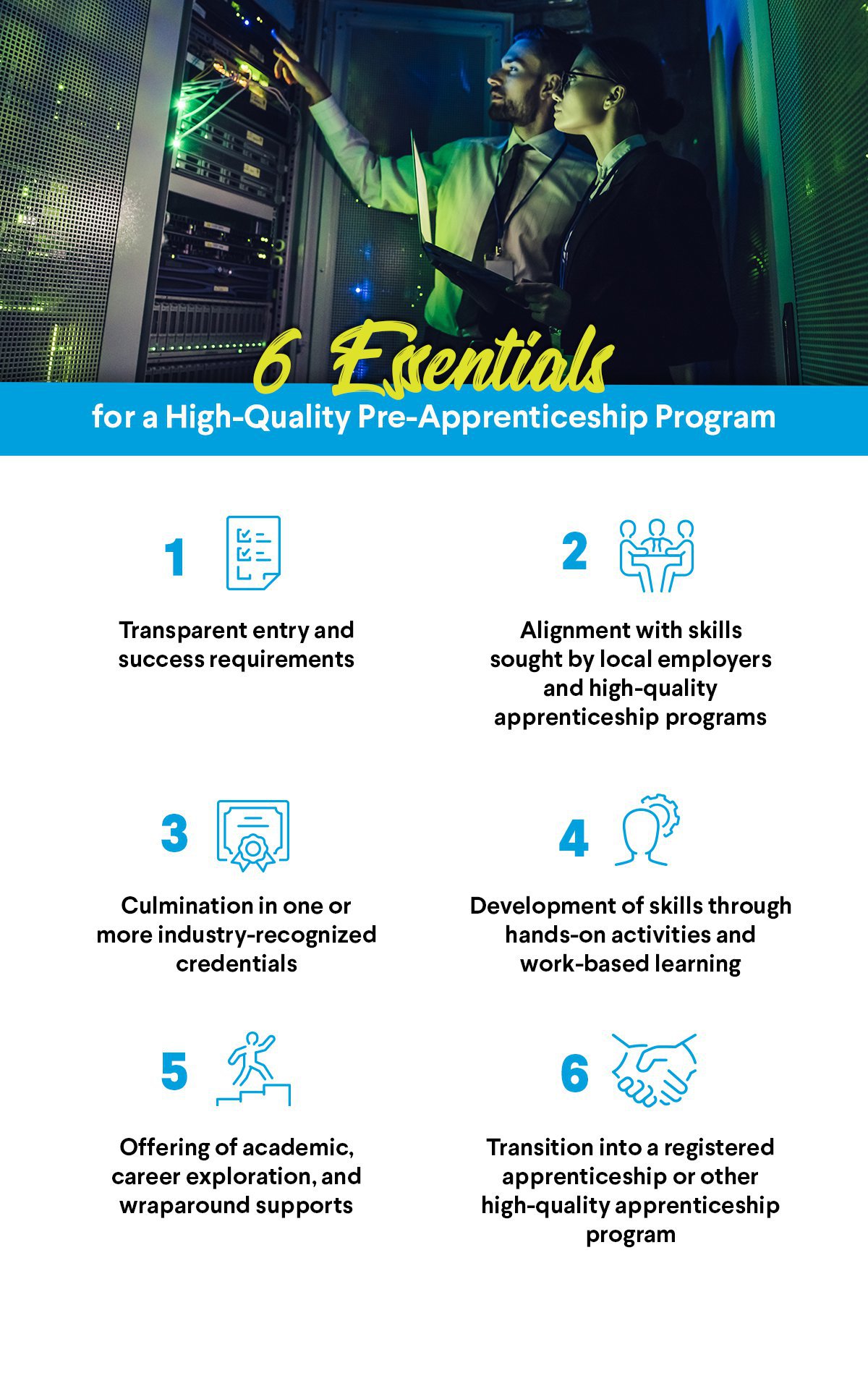
JFF's Framework for a High-Quality Pre-Apprenticeship Program: Opportunity Youth
May 10, 2021
At a Glance
This pre-apprenticeship framework outlines strategies and promising practices for developing high-quality programs that serve opportunity youth participants.
About
This pre-apprenticeship framework outlines the six key characteristics of a high-quality pre-apprenticeship program with a focus on opportunity youth—young people aged 16 to 24 who are disconnected from the workforce and education systems. Building on JFF’s existing Framework for a High-Quality Pre-Apprenticeship Program, it provides specific recommendations for aligning training for opportunity youth and offers examples of promising practices for existing training programs.
Pre-apprenticeship programs, which vary in length, can be delivered by a range of entities and are designed to prepare participants for success in Registered Apprenticeships or other high-quality apprenticeship programs and ultimately careers.
This framework can be used by new or existing programs to help guide their growth and development in both creating formal pre-apprenticeships and strengthening their existing training practices.
What is Pre-Apprenticeship?
Pre-apprenticeship is a program or set of services that offers participants structured training opportunities to prepare them for entry into an apprenticeship or Registered Apprenticeship program.
About Opportunity Youth
While there is a comprehensive apprenticeship system for adults and a growing movement to expand access to apprenticeship for high school and college students, young people who are disconnected from the education and workforce systems or who lack the credentials and skills necessary to access postsecondary pathways are often unable to take advantage of this valuable training opportunity.
As of January 2020, there were 4.9 million of these “opportunity youth” in the United States, and according to an article from the National Conference of State Legislatures that number will grow to roughly 10 million as a result of the pandemic. Measure of America has also projected that youth disconnection rates will grow, estimating that more than 25 percent of all young people could become disconnected from work and education. For these young people, building skills and gaining work experience are key to upward mobility.
Adapting the Framework for Opportunity Youth
Apprenticeship can be a powerful tool for keeping young people engaged in work and education pathways while providing them with quality mentoring, services, and support. The structured earn-and-learn program is used in a broad range of high-growth industries to train workers while they receive pay and valuable classroom and on-the-job education. However, opportunity youth are often unable to take advantage of apprenticeships due to prerequisite requirements and a lack of awareness about available programs. These barriers are exacerbated in apprenticeship programs that lack proper diversity, equity, and inclusion practices. Pre-apprenticeship programs can help young people build the skills, capacities, and mindsets needed to enter and succeed in an apprenticeship while advancing equity across employers and industries.
Getting opportunity youth involved in apprenticeships can go a long way toward ensuring that they are not left behind. High-quality pre-apprenticeships will apply a strong lens of racial and social equity to all facets of their program design and training structure and will integrate best practices that meet the diverse needs of the participants and communities they serve.
Moreover, as employer demand for highly skilled workers increases as older workers retire and the number of new technologies grows, opportunity youth can fill the resulting gap in the labor market with the right training and support. Employers like State Street have even begun noting higher retention rates for youth hired through partnerships with programs like Year Up than “traditional hires.” While elements of this framework can help programs support opportunity youth and expand access to careers, there is a critical need to advance racial and social equity in our national systems, including workforce development. Making this approach a core component of employer partnerships and embedding it into the provision of supportive wraparound services will help pre-apprenticeships increase access to high-quality career pathways for young people.
The purpose of this framework is to offer guidance to community-based organizations, training providers, employers, and other practitioners interested in developing a quality pre-apprenticeship program that is aligned with the specific needs of opportunity youth and that advances equity in the workforce. It adapts the quality elements of JFF’s Framework for a High-Quality Pre-Apprenticeship Program and provides recommendations specific to opportunity youth. These elements include:
- Transparent entry and success requirements
- Alignment of skill development with local employer and apprenticeship demand
- Provision of industry-recognized credentials
- Development of skills through work-based learning
- Inclusion of academic and career exploration, as well as wraparound supports
- Connections and transitions into a Registered Apprenticeship
This resource also spotlights several high-performing pre-apprenticeship programs for opportunity youth. These spotlights offer examples for how the various components of pre-apprenticeship can be developed and highlight a range of approaches to designing trainings that provide participants with the skills, competencies, and experience needed to access and progress through career and education pathways. For a more detailed description of a high-performing pre-apprenticeship program, see a deeper case study, JFF’s Making Apprenticeship Work for Opportunity Youth, which shines a light onto the District 1199c Training & Upgrading Fund’s behavioral health apprenticeship pathway for opportunity youth.

Characteristics
Discover the characteristics of a high-quality pre-apprenticeship program, adapted for opportunity youth, with examples from the field:
Conclusion
For too long, opportunity youth have been left behind in the apprenticeship movement. This framework aims to address that gap with specific guidance to drive strong programming. The promising practices outlined in this framework can help existing pre-apprenticeship programs strengthen their programming so that opportunity youth and other low-income young adults can succeed and make successful transitions to high-quality apprenticeship programs. It can also serve as a guide for those seeking to design new pre-apprenticeship programs for opportunity youth. With the right supports and opportunities, this population can thrive in apprenticeship pathways that enable them to learn, earn a paycheck, and advance in their careers.
Acknowledgments
We would like to thank the U.S. Department of Labor for providing the funding to support this work and for its commitment to advancing diversity, equity, and inclusion in the apprenticeship and workforce systems. We would also like to thank our network of Apprenticeship Expansion and Modernization Fund (AEMF) sites, which are working to modernize and expand pathways to apprenticeship for opportunity youth.
We want to extend a special thank you to our colleagues Cheryl Feldman and Edison Freire for their review of and contribution to this framework.
Finally, we would like to thank and acknowledge the programs and training providers featured in this framework. We appreciate their thoughtful feedback and willingness to share promising practices and recommendations for this work. These sites include:
- American YouthWorks
- The Wisconsin Regional Training Partnership (WRTP)
- The Urban Technology Project
- The Corps Network
- PowerCorps Philadelphia
- YouthBuild Philadelphia Charter School
- Institute for American Apprenticeships
Related Content

Pre-Apprenticeship
Pre-apprenticeship programs prepare individuals to enter and succeed in a Registered Apprenticeship or other high-quality apprenticeship program, and ultimately a career. They can be delivered by a range of entities, including community-based organizations, high schools,…

JFF's Framework for a High-Quality Pre-Apprenticeship Program
These 6 aspirational characteristics of high-quality pre-apprenticeship programs can build equity and improve success in new or existing programs. Pre-apprenticeship programs can be delivered by a range of entities and are designed to prepare underprepared…

Framework for a High-Quality Pre-Apprenticeship Program: IT
This pre-apprenticeship framework outlines the six key characteristics of a high-quality pre-apprenticeship program with a focus on the IT industry. What is Pre-Apprenticeship? This pre-apprenticeship framework outlines the six key characteristics of a high-quality pre-apprenticeship…

Webinar | The Essentials of a High-Quality Pre-Apprenticeship Program
This webinar event explored the characteristics of JFF’s Framework for a High-Quality Pre-Apprenticeship Program, what IBM looks for in a pre-apprenticeship, and how Pennsylvania is supporting these programs.

How Apprenticeship Programs for Opportunity Youth Stay Resilient Through the COVID-19 Recession
This report looks at strategies for sustaining and expanding Registered Apprenticeship pathways for opportunity youth during the COVID-19 pandemic. The authors highlight promising practices from workforce boards and community-based organizations, and address topics including the…

Expanding Apprenticeship to Opportunity Youth
Learn More About Apprenticeship and Work-Based Learning for Opportunity Youth With the support of the U.S. Department of Labor’s Apprenticeship Expansion and Modernization Fund, JFF is increasing access to Registered Apprenticeship programs for opportunity youth—young…

Apprenticeship & Work-Based Learning for Opportunity Youth
While there is a comprehensive apprenticeship system for adults and a growing movement to expand access to apprenticeship for high school and college students, young people who are disconnected from the education and workforce systems…